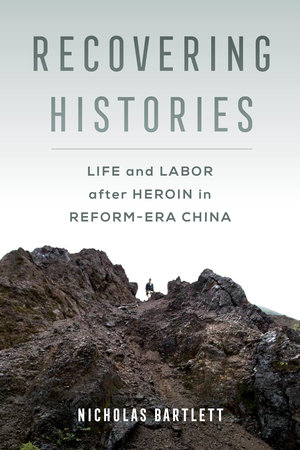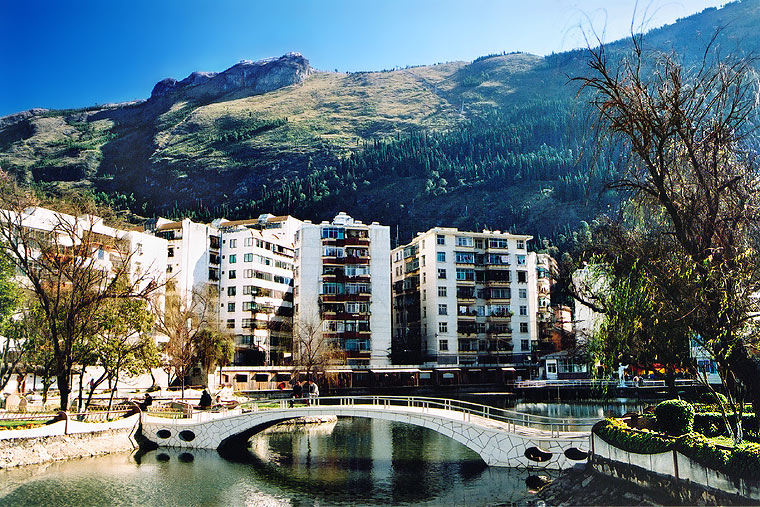Book Review – Recovering Histories: Life and Labor After Heroin in Reform-Era China
While reading Nicholas Bartlett’s new book, Recovering Histories: Life and Labor after Heroin in Reform-Era China, I was reminded of a phrase I read in an interview the New York Times Book Review did with former president Barak Obama: radical empathy. For Obama, reading other people’s stories is key to realizing that no matter what our race, politics or background, we are more alike than we are different, sharing similar hopes and dreams and sharing in life’s sufferings, losses and disappointments. Recovering Histories, by following 10 middle-age Chinese people with heroin-use history, provides that radical empathy. The problems that brought them to drugs, the struggles in reclaiming their lives, the families broken, the hope that many of them hold on to, these experiences will not be novel for most American readers. For many of us, we have seen our friends and family members face the same challenges here in the U.S. And, as Bartlett shows, the Chinese government’s response is very much like our own governments’: too few resources and too little care.
Bartlett tells the story of Gejiu, a Chinese city in southern Yunnan province famous for its tin mining and, up until the 1980s, known as a model Maoist city. With a prosperous, state-run tin mining industry, every family had the benefit of the iron rice bowl: a job for every resident and lifetime benefits for their families. Their children were set to lead the same life, inheriting their parents’ positions. But in 1979, Deng Xiaoping announced a new policy of “reform and opening”: opening the socialist economy to private enterprise. Not long after, private industry came to Gejiu and regulations on tin mining were lifted. Fast money could be made. All of Bartlett’s 10 characters were coming of age when reform and opening was announced, and each rejected their parents’ job, seeking to make quick money in the private tin mining industry or in other ventures that entertained the wealthy new capitalists. Soon though Gejiu had another distinction, the heroin capital of China, and each of Bartlett’s characters succumbed to the drug. Even those succeeding in the new economy of the late 1980s and early 1990s saw it all slip away.
Fast forward 20 years, we now see them in various stages of recovery, trying to get their lives back on track. As Bartlett notes in the introduction to Recovering Histories, his subjects all distinguish between “quitting drugs” and “returning to society”; many have been able to achieve the former, but the latter remains elusive. Largely unemployed and dependent on disappointed parents, Bartlett’s characters have too much time to think, to reflect on their past mistakes and their difficult futures. It is a testament to Bartlett’s narrative writing skills that he lets his characters speak in their own words. In a particularly poignant scene, Bartlett recounts the evening he spent at Zhijun’s home. At 44 years old, Zhijun is still living with his parents. While his mother cooks dinner, Zhijun pulls out an Atari game console, still in its original box. Zhijun had purchased it back in the 1980s when his motorcycle business was profitable. But with instructions in English, Zhijun was never able to hook it up to his TV, and, 20 years later, asks Bartlett for help. But the 1980s game console is too outdated to fit the flat screen TV; its moment had passed, much like Zhijun and many of the characters in Recovering Histories.
It isn’t initially clear why none of Bartlett’s characters are able to ‘return to society’ but slowly, through his characters’ stories, Bartlett reveals the prejudice and discrimination that people with a history of drug use face in China. It’s heartbreaking when Su, a rather optimistic sort and desperate to return to society, recounts how, on her first day at a new job, she was immediately let go, likely because her employer had found out about her previous history with drugs. This discrimination has largely been institutionalized, extending to the Chinese government. Although the Chinese government abolished some forms of extrajudicial detention, such as reeducation through labor (for political dissidents) and custody and education (for sex workers), such detention still exists for individuals who test positive for drugs, requiring, without a trial or any judicial intervention, work in a labor camp for up to a year. Ironically, once out, the government fails to provide any job opportunities for these individuals even though they are desperate to work. Bartlett attributes this desire to work as part of their socialist upbringing. But in many societies, including in the United States, work gives life meaning or at least a distraction from other issues, and without it, makes the return to drug use more likely.
Recovering Histories offers an important, counternarrative to the traditional viewpoint that reform and opening was a miracle that lifted an estimated 800 million out of poverty and set China on the road to becoming the world’s second largest economy. Instead it shows the human toll of radically transforming a society in the matter of a decade and the people the government chooses to leave behind. Recovering Histories is an essential read not just because it puts a human face on China’s reform and opening policy but, in its radical empathy, puts a human face on people with a history of drug use globally. And while the book is a critique of China’s failed response, the reader can’t help but wonder: is any country getting this right? Is any country ensuring that the potential of their Sus and Zhijuns is not wasted? Recovering Histories, with its focus on China, is not tasked with figuring out the rest of the world. That is left for us.
Rating: 




Recovering Histories: Life and Labor after Heroin in Reform-Era China, by Nicholas Bartlett (UC Press, 2020), 222 pages (with 100 of those pages being bibliography, so only 120 pages of real reading).
Interested in purchasing the book? Considering supporting your local, independent bookstore. Find the nearest one here.
 On Facebook
On Facebook By Email
By Email 


